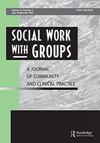Group work training for mental health professionals working with Syrian refugee children in Turkey: a needs assessment study
引用次数: 1
Abstract
ABSTRACT This study employed a grounded theory approach to understand group work training for mental health professionals (MHPs) working with Syrian refugee children in Turkey. Specifically, the authors set out to discover the barriers that prevent MHPs from conducting effective group work, elaborate on needed content and structure of the groups, highlight their potential benefits, and provide recommendations for conducting more effective group work to mitigate traumatic symptoms of Syrian refugee children. Interviews were conducted with 10 MHPs, including social workers (n = 4), psychologists (n = 5) and a psychiatrist (n = 1). Results revealed three themes including, i) Barriers for group work, ii) Benefits of group work, and iii) Recommendations for group work. Barriers included issues related to culture and language, access, intervention, organization and system-related barriers, and barriers stemming from ongoing trauma and abuse of Syrian refugee children, as well as secondary trauma of MHPs providing services. Benefits included MHPs’ perceived personal and interpersonal development skills, trauma resilience, and adjustment and adaptation for Syrian refugee children. Recommendations to mitigate the barriers for group work included the necessity of short term, cost-effective, ongoing crisis interventions that address stabilization and regulation of refugee children’s functioning. The study highlighted the importance of the effectiveness of interventions linked to qualifications of MHPs, designing group interventions that target the secondary trauma of MHPs, and the importance of psychosocial awareness interventions that aim to increase knowledge about refugee rights.为在土耳其从事叙利亚难民儿童工作的心理健康专业人员提供小组工作培训:需求评估研究
本研究采用扎根理论的方法来了解在土耳其与叙利亚难民儿童一起工作的心理健康专业人员(MHPs)的小组工作培训。具体而言,作者着手发现阻碍mhp进行有效小组工作的障碍,详细说明小组所需的内容和结构,强调其潜在的好处,并提供进行更有效小组工作的建议,以减轻叙利亚难民儿童的创伤症状。对10名MHPs进行了访谈,包括社会工作者(n = 4)、心理学家(n = 5)和精神科医生(n = 1)。结果揭示了三个主题,包括:i)小组工作的障碍,ii)小组工作的好处,iii)小组工作的建议。障碍包括与文化和语言、准入、干预、组织和系统相关的障碍,以及叙利亚难民儿童遭受的持续创伤和虐待所产生的障碍,以及提供服务的mhp的继发性创伤。好处包括MHPs感知到的个人和人际发展技能,创伤复原力,以及对叙利亚难民儿童的调整和适应。关于减轻小组工作障碍的建议包括必须采取短期、具有成本效益的持续危机干预措施,解决难民儿童功能的稳定和管理问题。该研究强调了与难民流离失所者资格相关的干预措施的有效性的重要性,设计了针对难民流离失所者继发性创伤的群体干预措施,以及旨在增加对难民权利的认识的社会心理意识干预措施的重要性。
本文章由计算机程序翻译,如有差异,请以英文原文为准。
求助全文
约1分钟内获得全文
求助全文
来源期刊

Social Work with Groups
Social Sciences-Social Sciences (miscellaneous)
CiteScore
1.30
自引率
0.00%
发文量
22
期刊介绍:
Social Work with Groups is a unique quarterly journal of community and clinical practice, and an important reference publication for those in the social work profession who value and seek to understand the small group. The journal addresses the issues of group work in psychiatric, rehabilitative, and multipurpose social work and social service agencies; crisis theory and group work; the use of group programs in clinical and community practice; and basic group competencies for all social work professionals. The contributions reflect a sophisticated knowledge of the use of the group as a learning medium and a highly developed understanding of instructional technology in the teaching of social group work knowledge and skills.
 求助内容:
求助内容: 应助结果提醒方式:
应助结果提醒方式:


